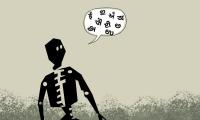"I do not believe that independence for Kashmir is a feasible or a viable option and I stand by that," he told Karan Thapar on Devil's Advocate programme.
Abdullah also felt that India "flunked a single window system" opportunity under then Pakistani President Pervez Musharraf to resolve the Kashmir issue.
Asked if he was prepared to voice his stand on the issue of independence in Srinagar, which recently witnessed protests with people shouting slogans for azadi, he said: "Be that as it may, it's not my job to follow popular mood. It's my job to tell the people what I believe is in their interest and I sincerely believe that it is not in their interest. It is not a viable alternative to suggest azadi or even accession to Pakistan," the NC leader said.
He said "I believe that you can give Kashmir independence but you cannot give Kashmir freedom under the circumstances that prevail within the subcontinent --India, Pakistan and China. Even if India and Pakistan were somehow to decide to give the state independence, it will never be really free."
On the problems facing Kashmir, Abdullah said the Valley needed political handling and not economic reconstruction packages and confidence-building measures.
Noting that he has been voicing his view that Kashmir is essentially a political issue in various forums including the Prime Ministers round table conferences, Abdullah said, "It needs political handling. Its not good enough that you give a Rs 24,000 crore economic reconstruction package or you announce all sorts of confidence-building measures. Its essentially about the political solution that you need to work out there."
Backing the recent agreement between Jammu and Kashmir government and Shri Amarnath Yatra Sangharsh Samiti, he said, "the bottom line for me is that if you dont agree with this agreement you might also turn around and say that you are against the yatra because there is nothing in this that should give anybody a cause for concern."
On if India had lost a chance to sort out the Kashmir issue in 2005-2006 with Musharaff, Abdullah told Thapar that the former Pakistani military ruler was a "single window system" and India flunked this opportunity."We lost it. Its gone. Musharaff was a single window system so to speak, that we had to deal with in Pakistan. That window has gone. We flunked it. All of us, we all played a part in it....Well we are living to rue it now. Had we worked out a solution with Pakistan in 20062007, we wouldn't (have) seen Kashmir inflamed in 2008," he said.
Asked if he agrees with National Security Advisor M K Narayanan's view that the Kashmir situation was not as bad as in the 1990s, Abdullah said,"Its bad. The difference between now and 1990s is that there are no guns and to that extent yes, the NSA is right when he says its not as bad as 1990 because in 1990 people like myself, my party colleagues, we were all fleeing.But I think he is being a little careful in assessing the actual mood of the people because the size of the protests that you saw in Kashmir, I think should give him more cause for concern than he is publicly stating," he said.
The NC chief also claimed that the recent protests in the Valley were spontaneous and that there was no Pakistani involvement in them.
Replying to questions on assembly polls in Kashmir keeping in view the present situation, Abdullah said they were possible by January next year, the due date.








